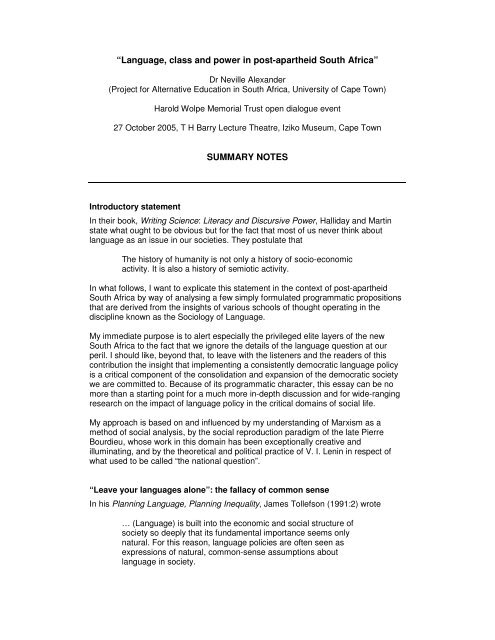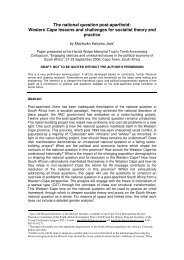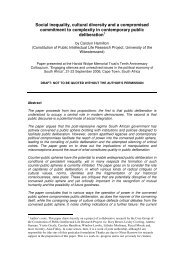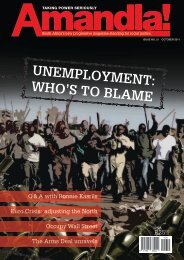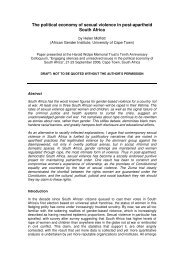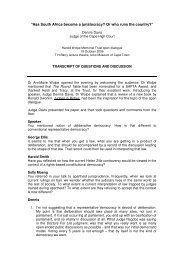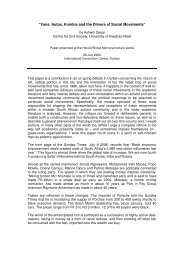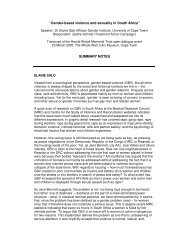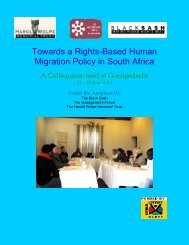Language, class and power in post-apartheid South Africa - ESCR-Net
Language, class and power in post-apartheid South Africa - ESCR-Net
Language, class and power in post-apartheid South Africa - ESCR-Net
You also want an ePaper? Increase the reach of your titles
YUMPU automatically turns print PDFs into web optimized ePapers that Google loves.
“<strong>Language</strong>, <strong>class</strong> <strong>and</strong> <strong>power</strong> <strong>in</strong> <strong>post</strong>-<strong>apartheid</strong> <strong>South</strong> <strong>Africa</strong>”Dr Neville Alex<strong>and</strong>er(Project for Alternative Education <strong>in</strong> <strong>South</strong> <strong>Africa</strong>, University of Cape Town)Harold Wolpe Memorial Trust open dialogue event27 October 2005, T H Barry Lecture Theatre, Iziko Museum, Cape TownSUMMARY NOTESIntroductory statementIn their book, Writ<strong>in</strong>g Science: Literacy <strong>and</strong> Discursive Power, Halliday <strong>and</strong> Mart<strong>in</strong>state what ought to be obvious but for the fact that most of us never th<strong>in</strong>k aboutlanguage as an issue <strong>in</strong> our societies. They <strong>post</strong>ulate thatThe history of humanity is not only a history of socio-economicactivity. It is also a history of semiotic activity.In what follows, I want to explicate this statement <strong>in</strong> the context of <strong>post</strong>-<strong>apartheid</strong><strong>South</strong> <strong>Africa</strong> by way of analys<strong>in</strong>g a few simply formulated programmatic propositionsthat are derived from the <strong>in</strong>sights of various schools of thought operat<strong>in</strong>g <strong>in</strong> thediscipl<strong>in</strong>e known as the Sociology of <strong>Language</strong>.My immediate purpose is to alert especially the privileged elite layers of the new<strong>South</strong> <strong>Africa</strong> to the fact that we ignore the details of the language question at ourperil. I should like, beyond that, to leave with the listeners <strong>and</strong> the readers of thiscontribution the <strong>in</strong>sight that implement<strong>in</strong>g a consistently democratic language policyis a critical component of the consolidation <strong>and</strong> expansion of the democratic societywe are committed to. Because of its programmatic character, this essay can be nomore than a start<strong>in</strong>g po<strong>in</strong>t for a much more <strong>in</strong>-depth discussion <strong>and</strong> for wide-rang<strong>in</strong>gresearch on the impact of language policy <strong>in</strong> the critical doma<strong>in</strong>s of social life.My approach is based on <strong>and</strong> <strong>in</strong>fluenced by my underst<strong>and</strong><strong>in</strong>g of Marxism as amethod of social analysis, by the social reproduction paradigm of the late PierreBourdieu, whose work <strong>in</strong> this doma<strong>in</strong> has been exceptionally creative <strong>and</strong>illum<strong>in</strong>at<strong>in</strong>g, <strong>and</strong> by the theoretical <strong>and</strong> political practice of V. I. Len<strong>in</strong> <strong>in</strong> respect ofwhat used to be called “the national question”.“Leave your languages alone”: the fallacy of common senseIn his Plann<strong>in</strong>g <strong>Language</strong>, Plann<strong>in</strong>g Inequality, James Tollefson (1991:2) wrote… (<strong>Language</strong>) is built <strong>in</strong>to the economic <strong>and</strong> social structure ofsociety so deeply that its fundamental importance seems onlynatural. For this reason, language policies are often seen asexpressions of natural, common-sense assumptions aboutlanguage <strong>in</strong> society.
Harold Wolpe Memorial Trust open dialogue event, 27 October 2005, Cape TownThe purpose of his book is to rebut this all-pervasive notion <strong>and</strong> to demonstrate byway of many significant historical <strong>and</strong> contemporary examples that language policiesare governmental strategies designed, mostly consciously, to promote the <strong>in</strong>terestsof specific <strong>class</strong>es <strong>and</strong> other social groups.This is, therefore, the first proposition to note; it is not true that languages simplydevelop “naturally”, as it were. They are formed <strong>and</strong> manipulated with<strong>in</strong> def<strong>in</strong>ite limitsto suit the <strong>in</strong>terests of different groups of people. This is very clear <strong>in</strong> the case of socalledst<strong>and</strong>ard languages, as opposed to non-st<strong>and</strong>ard varieties (dialects,sociolects). The former are <strong>in</strong>variably the preferred varieties of the rul<strong>in</strong>g <strong>class</strong> orrul<strong>in</strong>g strata <strong>in</strong> any given society. They prevail as the norm because of the economic,political-military, or cultural-symbolic <strong>power</strong> of the rulers, not because they are“natural” <strong>in</strong> any mean<strong>in</strong>g of the term. The importance of this proposition derives fromthe fact that it validates the claim that languages, just like cities or families, can beplanned. Indeed, it is a fact that <strong>in</strong> any modern state, whether or not it is explicitlyacknowledged by governments, languages are always planned, <strong>in</strong> that legislationprescribes, often <strong>in</strong> great detail, where <strong>and</strong> how one or more languages are to beused. This is universal practice <strong>and</strong>, as I shall have occasion to show, it hassignificant consequences <strong>in</strong> critical doma<strong>in</strong>s such as education.In regard to <strong>post</strong>-<strong>apartheid</strong> <strong>South</strong> <strong>Africa</strong>, it rema<strong>in</strong>s to be said that the pr<strong>in</strong>ciple – aswell as the practice – of language plann<strong>in</strong>g is accepted. However, lack ofimplementation plann<strong>in</strong>g <strong>and</strong>, thus, of delivery, tends to negate the pr<strong>in</strong>ciple <strong>and</strong> toreduce it to mere lip service.The <strong>power</strong> of language <strong>and</strong> the language of <strong>power</strong>There are two fundamental sources from which language derives its <strong>power</strong>, i.e., theability of the <strong>in</strong>dividuals or groups to realise their <strong>in</strong>tentions (will) by means oflanguage (em<strong>power</strong>ment) or, conversely, the ability of <strong>in</strong>dividuals or groups toimpose their agendas on others (disem<strong>power</strong>ment of the latter). For human be<strong>in</strong>gs toproduce the means of subsistence, they have to cooperate <strong>and</strong> <strong>in</strong> order to do so,they have to communicate. <strong>Language</strong> is the ma<strong>in</strong> <strong>in</strong>strument of communication at thedisposal of human be<strong>in</strong>gs; consequently, the specific language(s) <strong>in</strong> which theproduction processes take place become(s) the language(s) of <strong>power</strong>. To put itdifferently, if one does not comm<strong>and</strong> the language(s) of production, one isautomatically excluded <strong>and</strong> disem<strong>power</strong>ed. At this po<strong>in</strong>t, the relationship betweenlanguage policy, <strong>class</strong> <strong>and</strong> <strong>power</strong> ought to become <strong>in</strong>tuitively obvious. But, as I knowfrom many years of experience, this is an optimistic view. Consequently, I shall spellout some of the implications of this particular <strong>in</strong>sight for modern <strong>in</strong>dustrial societies 1 .For reasons connected with the colonial history of southern <strong>Africa</strong>, the language of<strong>power</strong> <strong>in</strong> <strong>post</strong>-<strong>apartheid</strong> <strong>South</strong> <strong>Africa</strong> is undoubtedly English. Afrikaans cont<strong>in</strong>ues toplay an ancillary role <strong>in</strong> the processes of economic production <strong>in</strong> the so-called formaleconomy even though there are determ<strong>in</strong>ed attempts to reduce its significance <strong>in</strong> thisdoma<strong>in</strong> as well as <strong>in</strong> other high-status doma<strong>in</strong>s. The question that we will have toconsider presently is whether this fact <strong>in</strong> <strong>and</strong> of itself implies, as is often said <strong>and</strong>universally assumed, that “English is enough” <strong>and</strong> what the implications of this beliefare for democracy <strong>and</strong> development.1 In a recent paper prepared for a conference on <strong>Language</strong> <strong>and</strong> Poverty, held at CornellUniversity <strong>in</strong> the U.S.A., I discussed these implications <strong>in</strong> detail as they perta<strong>in</strong> to theeducational system.2
<strong>Language</strong>, <strong>power</strong> <strong>and</strong> <strong>class</strong> <strong>in</strong> <strong>post</strong>-<strong>apartheid</strong> <strong>South</strong> <strong>Africa</strong>The other source of the <strong>power</strong> of language is its function as a transmissionmechanism of “culture” or, more popularly, its role <strong>in</strong> the formation of <strong>in</strong>dividual <strong>and</strong>social identities. In this essay, I shall not deal with this matter any further even thoughit is necessarily implicated <strong>in</strong> the general discussion of the broader topic of“language, <strong>class</strong> <strong>and</strong> <strong>power</strong>”. The reason for this is that consideration of thepsychological <strong>and</strong> sociological issues <strong>in</strong>volved <strong>in</strong> the question of identity would tendto blur our focus. Suffice it to say, therefore, that be<strong>in</strong>g able to use the language(s)one has the best comm<strong>and</strong> of <strong>in</strong> any situation is an em<strong>power</strong><strong>in</strong>g factor <strong>and</strong>,conversely, not be<strong>in</strong>g able to do so is necessarily disem<strong>power</strong><strong>in</strong>g. The self esteem,self-confidence, potential creativity <strong>and</strong> spontaneity that come with be<strong>in</strong>g able to usethe language(s) that have shaped one from early childhood (one’s mother tongue) isthe foundation of all democratic polities <strong>and</strong> <strong>in</strong>stitutions. To be denied the use of thislanguage is the very mean<strong>in</strong>g of oppression. In Len<strong>in</strong>’s words,“… (a) democratic state is bound to grant complete freedom for thenative languages <strong>and</strong> annul all privileges for any one language. Ademocratic state will not permit the oppression or the overrid<strong>in</strong>g ofany one nationality by another, either <strong>in</strong> any particular region or <strong>in</strong>any branch of public affairs” (Len<strong>in</strong> 1983:138. Emphasis <strong>in</strong> theorig<strong>in</strong>al).English is enough: the <strong>class</strong> character of the monol<strong>in</strong>gual habitusThe hegemony of English, or of other languages, is not merelytolerated <strong>in</strong> the ‘develop<strong>in</strong>g’ world; it is considered a legitimatemodel for society. In many newly <strong>in</strong>dependent states, a t<strong>in</strong>yEnglish-speak<strong>in</strong>g elite controls state policy-mak<strong>in</strong>g organs while themasses of the people rema<strong>in</strong> excluded. … A world system that ismore just <strong>and</strong> equitable depends upon an underst<strong>and</strong><strong>in</strong>g of howpeople can ga<strong>in</strong> control of their own <strong>in</strong>stitutions. A key issue is therole of language <strong>in</strong> organiz<strong>in</strong>g <strong>and</strong> reproduc<strong>in</strong>g those <strong>in</strong>stitutions(Tollefson 1991:201).Twenty years earlier, Pierre Alex<strong>and</strong>re (1972:86) had shown clearly how for <strong>post</strong>colonial<strong>Africa</strong>, proficiency <strong>in</strong> the language of the former colonial <strong>power</strong> (English,French or Portuguese) constituted “cultural capital” <strong>and</strong> was an <strong>in</strong>dex to the <strong>class</strong>location of the <strong>in</strong>dividual, s<strong>in</strong>ce this ability almost automatically elevated the speaker<strong>in</strong>to the rul<strong>in</strong>g elite. At this po<strong>in</strong>t, it would be necessary to discuss <strong>in</strong> some detailPierre Bourdieu’s theory of the evolution of l<strong>in</strong>guistic markets, from which this <strong>in</strong>sightderives. For reasons of focus, however, I shall simply draw attention to theimmediately relevant propositions as they apply to our own context 2 . The hierarchicalrelations between different varieties of a language or between different languagesare a reflection of the historically evolved relations of dom<strong>in</strong>ation <strong>and</strong> subjugationbetween the speakers of the relevant varieties or languages. In the <strong>South</strong> <strong>Africa</strong>ncase, Dutch, English <strong>and</strong>, later, Afrikaans, came to be the “legitimate languages” <strong>in</strong>different periods of our history. This legitimacy was/is the result of colonial conquest<strong>in</strong> the first <strong>in</strong>stance but, as the structural transformations that accompanied thatcataclysmic event became rout<strong>in</strong>e, dom<strong>in</strong>ance was complemented <strong>and</strong> re<strong>in</strong>forced byhegemony. That is to say, consent of the victims of colonial subjugation became the2 An excellent summary of Bourdieu’s theory as it perta<strong>in</strong>s to the language question is Niedrig2000:21-27. It is, however, only available <strong>in</strong> German. The <strong>class</strong>ic English exposition of therelevant theory is Bourdieu 1991.3
Harold Wolpe Memorial Trust open dialogue event, 27 October 2005, Cape Townmajor factor for the ma<strong>in</strong>tenance of English <strong>and</strong> Afrikaans (until 1994 approximately)as the legitimate languages. In <strong>South</strong> <strong>Africa</strong>, unlike most other <strong>Africa</strong>n countries <strong>in</strong>the British sphere of <strong>in</strong>fluence, the presence of a relatively large group of L1-speakers of English reduced the potential “profits of dist<strong>in</strong>ction” that came withproficiency <strong>in</strong> the legitimate language, although the rate of profit rema<strong>in</strong>s relativelyhigh. For, accord<strong>in</strong>g to Bourdieu, the smaller the number of people who areproficient <strong>in</strong> the legitimate variety <strong>and</strong> the more widespread the perception of thevalue of that variety <strong>in</strong> the relevant population, the greater the profits of dist<strong>in</strong>ction.This is, <strong>in</strong>cidentally, the objective economic reason for the phenomenon of “eliteclosure” referred to later. I make the po<strong>in</strong>t here, simply to stress the fact that there isa material reason for the ma<strong>in</strong>tenance of a particular language policy <strong>in</strong> any givenperiod.This <strong>in</strong>sight, true as it is, does not tell us anyth<strong>in</strong>g about the <strong>class</strong> consciousness orthe <strong>class</strong> position of <strong>in</strong>dividual members of the elite. What has to be established <strong>in</strong>any given case, therefore, is the degree of consciousness of the rul<strong>in</strong>g strata of thede facto policy of “elite closure” 3 or exclusion of the masses by means of languagepolicy 4 . To do so is no easy task, s<strong>in</strong>ce the levels of mystification <strong>and</strong>, moreproblematically, the veils of ignorance that delude policy makers <strong>and</strong> other <strong>power</strong>brokers <strong>in</strong>to believ<strong>in</strong>g that their underst<strong>and</strong><strong>in</strong>gs are “scientific”, defy the logic of mereargument <strong>and</strong> historical experience.The relevant essential proposition is simple enough. It states that <strong>in</strong> a multil<strong>in</strong>gualsociety, it is <strong>in</strong> everyone’s <strong>in</strong>terest to learn the dom<strong>in</strong>ant language (of <strong>power</strong>), s<strong>in</strong>cethis will help to provide equal opportunities <strong>in</strong> the labour market as well as <strong>in</strong> othermarkets. In <strong>post</strong>-colonial <strong>Africa</strong>, this has led to the almost complete marg<strong>in</strong>alisation ofthe local languages of the people <strong>and</strong> the valorisation of English, French <strong>and</strong>Portuguese <strong>in</strong> the relevant <strong>Africa</strong>n states. Indeed, <strong>in</strong> most other <strong>Africa</strong>n states, thedist<strong>in</strong>ction between “official”, i.e., European, <strong>and</strong> “national” (<strong>Africa</strong>n) languagesironically highlights <strong>in</strong> an un<strong>in</strong>tended manner the social distance between the elite<strong>and</strong> the masses of the people. Because of the role model status of the middle <strong>class</strong><strong>in</strong> most societies, the monol<strong>in</strong>gual habitus 5 becomes generalised <strong>in</strong> such a mannerthat the vast majority of the people come to believe that all that matters is knowledgeof English <strong>in</strong> so-called anglophone <strong>Africa</strong>. This utterly disem<strong>power</strong><strong>in</strong>g dispositionassumes the character of a social pathology, one which I have called the “StaticMa<strong>in</strong>tenance Syndrome” 6 .3 This concept is described by its author as “a tactic of boundary ma<strong>in</strong>tenance. It <strong>in</strong>volves<strong>in</strong>stitutionaliz<strong>in</strong>g the l<strong>in</strong>guistic patterns of the elite, either through official policy or <strong>in</strong>formallyestablished usage norms <strong>in</strong> order to limit access to socioeconomic mobility <strong>and</strong> political<strong>power</strong> to people who possess the requisite l<strong>in</strong>guistic patterns” (Scotton 1990:27). She alsomakes it clear that <strong>in</strong> sub-Saharan <strong>Africa</strong>, we are <strong>in</strong>variably deal<strong>in</strong>g with cases of “strong eliteclosure”, where the social gap between the elites <strong>and</strong> the masses is deepened by thedom<strong>in</strong>ant position of foreign, i.e., European, languages <strong>in</strong> which more than half of thepopulation do not have adequate proficiency. (Scotton 1990:27-28)4 Our Nigerian colleague, Ayo Bamgbose, Emeritus Professor of L<strong>in</strong>guistics <strong>and</strong> <strong>Africa</strong>n<strong>Language</strong>s at the University of Ibadan, published an elegant study of the many ways <strong>in</strong> whichelite closure has operated <strong>in</strong> <strong>post</strong>-colonial <strong>Africa</strong>. His justified optimism about the evolv<strong>in</strong>glanguage policy <strong>in</strong> the new <strong>South</strong> <strong>Africa</strong> at the time still has to be realised <strong>in</strong> practice. (SeeBamgbose 2000)5 Ingrid Gogl<strong>in</strong> (1994), bas<strong>in</strong>g herself on Bourdieu’s work, co<strong>in</strong>s the term “monol<strong>in</strong>gualhabitus” <strong>in</strong> order to describe the ironical phenomenon of, among other th<strong>in</strong>gs, coloniallyoppressed peoples who “voluntarily” deny that their <strong>in</strong>digenous languages have any value<strong>and</strong> valorize only the former colonial language(s). In metropolitan European states, thisvalorisation is manifest <strong>in</strong> the st<strong>and</strong>ard variety of the relevant language.6 This means simply that most <strong>Africa</strong>n people are will<strong>in</strong>g to ma<strong>in</strong>ta<strong>in</strong> their first languages <strong>in</strong>the primary contexts of family, community, primary school <strong>and</strong> religious practice but they do4
<strong>Language</strong>, <strong>power</strong> <strong>and</strong> <strong>class</strong> <strong>in</strong> <strong>post</strong>-<strong>apartheid</strong> <strong>South</strong> <strong>Africa</strong>To add <strong>in</strong>sult to <strong>in</strong>jury, as it were, Tollefson’s paradox notes that <strong>in</strong> modern societies,… while vast resources are directed toward language teach<strong>in</strong>g <strong>and</strong>bil<strong>in</strong>gualism, especially <strong>in</strong>volv<strong>in</strong>g English, more people than everare unable to acquire the language skills they need <strong>in</strong> order to enter<strong>and</strong> succeed <strong>in</strong> school, obta<strong>in</strong> satisfactory employment, <strong>and</strong>participate politically <strong>and</strong> socially <strong>in</strong> the life of their communities. …The great l<strong>in</strong>guistic paradox of our time is that societies whichdedicate enormous resources to language teach<strong>in</strong>g <strong>and</strong> learn<strong>in</strong>ghave been unable – or unwill<strong>in</strong>g to remove the <strong>power</strong>ful l<strong>in</strong>guisticbarriers to full participation <strong>in</strong> the major <strong>in</strong>stitutions of modernsociety. (Tollefson 1991:7)Tollefson arrives at the conclusion that <strong>in</strong>adequate competence is not ma<strong>in</strong>ly theresult of poor books <strong>and</strong> other texts, <strong>in</strong>adequate pedagogy or lack of motivation <strong>and</strong>other similar suggested deficiencies. Instead,… language competence rema<strong>in</strong>s a barrier to employment,education, <strong>and</strong> economic well be<strong>in</strong>g due to political forces of ourown mak<strong>in</strong>g. For while modern social <strong>and</strong> economic systemsrequire certa<strong>in</strong> k<strong>in</strong>ds of language competence, they simultaneouslycreate conditions which ensure that vast numbers of people will beunable to acquire that competence. A central mechanism by whichthis process occurs is language policy. (Tollefson 1991:7)While it is underst<strong>and</strong>able, given the colonial <strong>and</strong> racist history of <strong>South</strong> <strong>Africa</strong>, thatbefore 1973 the rul<strong>in</strong>g <strong>class</strong> was fundamentally concerned with ma<strong>in</strong>ta<strong>in</strong><strong>in</strong>g thelimited markets <strong>in</strong> raw materials <strong>and</strong> semi-processed commodities which <strong>South</strong><strong>Africa</strong>, because of its place <strong>in</strong> the <strong>in</strong>ternational division of labour, had to provide tothe transnational corporations <strong>and</strong> other imperialist entities, the implicit cont<strong>in</strong>uationof such policies <strong>in</strong> <strong>post</strong>-<strong>apartheid</strong> <strong>South</strong> <strong>Africa</strong> is someth<strong>in</strong>g of an anomaly. For,whereas <strong>in</strong> <strong>apartheid</strong> <strong>South</strong> <strong>Africa</strong>, the rulers could afford to, <strong>and</strong> did, approach<strong>Africa</strong>n languages as though they had no economic or cultural value, <strong>in</strong> the new<strong>South</strong> <strong>Africa</strong>, this attitude is clearly self-limit<strong>in</strong>g <strong>and</strong> self-defeat<strong>in</strong>g, if not selfdestructive.Unless we are prepared to grant that we are simply trott<strong>in</strong>g along thesame footpaths as those pioneered by the neo-colonial states after 1960, where the<strong>in</strong>digenous languages of <strong>Africa</strong> were not seen as resources but as problems. In thisconnection, it is germane to our focus to po<strong>in</strong>t to the fact that <strong>Africa</strong>, <strong>in</strong>clud<strong>in</strong>g <strong>South</strong><strong>Africa</strong>, is today subject to the <strong>in</strong>tensified pressures of “globalisation” <strong>and</strong> that thepressure to adopt English, which is <strong>in</strong>contestably the global language, as the onlylegitimate language is exceptionally strong <strong>in</strong> “anglophone” territories 7 .In this respect, a caveat is <strong>in</strong> place. We have to be exceptionally careful not to fall<strong>in</strong>to the trap of prescrib<strong>in</strong>g cures that turn out to be worse than the sickness itself. Arecent str<strong>and</strong> of analysis that attempts to view the political economy of language <strong>in</strong>terms of “functional multil<strong>in</strong>gualism” <strong>in</strong> economic life runs the risk, <strong>in</strong> my op<strong>in</strong>ion, ofpromot<strong>in</strong>g a k<strong>in</strong>d of economic diglossia where the “m<strong>in</strong>ority” languages are conf<strong>in</strong>edas <strong>in</strong>struments of communication <strong>in</strong> the processes of production, exchange <strong>and</strong>not believe that these languages have the capacity to develop <strong>in</strong>to languages of <strong>power</strong>. Theirconsciousness reflects the reality of the l<strong>in</strong>guistic market <strong>and</strong> they have become victims of amonol<strong>in</strong>gual habitus, <strong>in</strong> spite of the fact that most <strong>Africa</strong>n people are proficient <strong>in</strong> two or morelanguages.7 For a more detailed discussion of this aspect of the issue, see Alex<strong>and</strong>er 2005 (a).5
Harold Wolpe Memorial Trust open dialogue event, 27 October 2005, Cape Towndistribution to the so-called <strong>in</strong>formal sector, as aga<strong>in</strong>st the nationally dom<strong>in</strong>antlanguages (<strong>in</strong> <strong>Africa</strong>, these are almost without exception languages of Europeanorig<strong>in</strong>) that perform these <strong>power</strong>ful functions <strong>in</strong> the “formal” economy 8 . Thisapproach to the issue derives from a dual-economy paradigm that has a long historybut, even if it had been useful <strong>in</strong> earlier times, is particularly irrelevant <strong>and</strong> mislead<strong>in</strong>g<strong>in</strong> the era of globalisation. Ultimately, it may do no more than serve as an apologeticjustification for the perpetuation of exist<strong>in</strong>g social stratification. In <strong>Africa</strong> specifically,the languages of the majority of the people have to become the dom<strong>in</strong>ant languages,<strong>in</strong> whatever comb<strong>in</strong>ations, <strong>in</strong> the respective economy, taken as a whole, of the<strong>in</strong>dividual countries. Only if this happens will the danger of a two-tier citizen-subjectsocial model be countered <strong>in</strong> favour of a democratic system where all are citizens<strong>and</strong> all have similar life chances. Djité (2005) has written a useful analytical essay onthe subject from the po<strong>in</strong>t of view not of m<strong>in</strong>orities <strong>in</strong> Europe, North America, <strong>and</strong>elsewhere but from that of the “third world”, where the “<strong>in</strong>formal economy” is often themajor contributor to the GDP or the ma<strong>in</strong> source of employment (Djité 2005:15).Both Djité <strong>and</strong> Edwards (2005) <strong>in</strong> mercifully jargon-free essays have demonstratedhow <strong>in</strong> economically more developed countries, this <strong>in</strong>formal sector constitutes a setof niche markets <strong>in</strong> which, necessarily, local languages are essential for lubricat<strong>in</strong>gthe economic processes. Edwards also po<strong>in</strong>ts to the fact that these niche marketsare often rapidly occupied by the products of mult<strong>in</strong>ational firms. In so do<strong>in</strong>g, shegives one more <strong>in</strong>dication that the notion of a “dual economy” is no more than anabstraction. Both of them also <strong>in</strong>sist that the economic benefits of multil<strong>in</strong>gualismshould be transferred to the central economies. In respect of <strong>Africa</strong>, Djité (2005:22)concludes with unerr<strong>in</strong>g logic thatCommunication facilitated <strong>in</strong> the local languages will remove the<strong>in</strong>efficiencies <strong>in</strong>troduced by the selection <strong>and</strong> promotion of the officiallanguage, <strong>and</strong> policies that promote growth with equity are necessaryto achieve socio-economic <strong>in</strong>clusion for all.Edwards (2005:164) similarly warns aga<strong>in</strong>st the establishment of economic diglossiaor ghettoisation of the “m<strong>in</strong>ority languages” by stat<strong>in</strong>g clearly thatEnglish may be the language of global trad<strong>in</strong>g, but the ability to speakother languages none the less ensures a competitive edge. Themultil<strong>in</strong>gual populations of <strong>in</strong>ner-circle countries are a valuableresource, which we overlook at our peril. Their contribution to<strong>in</strong>ternational bus<strong>in</strong>ess is becom<strong>in</strong>g <strong>in</strong>creas<strong>in</strong>gly evident <strong>in</strong> areas suchas Ch<strong>in</strong>a <strong>and</strong> the Middle East. … Initiatives that target m<strong>in</strong>orities relyheavily on the knowledge <strong>and</strong> experience of m<strong>in</strong>ority-languagespeakers. … Bil<strong>in</strong>guals are a marketable commodity; the ability tospeak other languages opens up a far wider range of better-paidemployment opportunities than might otherwise be the case.The centrality of educationBourdieu stresses the social reproductive role of education <strong>in</strong> this regard. Throughcompulsory education, <strong>in</strong>dividuals are forced – <strong>and</strong> also want - to learn the legitimatelanguage, ma<strong>in</strong>ly because of its pivotal role <strong>in</strong> the production processes <strong>and</strong> thesocial status that proficiency <strong>in</strong> it confers on its speakers. An array of certificates,diplomas <strong>and</strong> degrees constitute a market, regardless of the real levels of proficiency8 See Stroud <strong>and</strong> Hyltenstam 2005 for an <strong>in</strong>troduction to the field.6
<strong>Language</strong>, <strong>power</strong> <strong>and</strong> <strong>class</strong> <strong>in</strong> <strong>post</strong>-<strong>apartheid</strong> <strong>South</strong> <strong>Africa</strong><strong>and</strong> competence, <strong>and</strong> are traded like any other commodity. They take on thecharacter of “cultural capital” (assets) <strong>and</strong> can be translated <strong>in</strong>to economic assets viaenhanced salaries, wages, bonuses, <strong>and</strong> other rewards. L<strong>in</strong>guistic capital isnecessarily the most important component of this cultural capital.The legacy of <strong>apartheid</strong> education <strong>in</strong> <strong>South</strong> <strong>Africa</strong> exacerbates the StaticMa<strong>in</strong>tenance Syndrome referred to above, s<strong>in</strong>ce most black people cont<strong>in</strong>ue toequate mother tongue-based education with the ravages of Bantu education. Withoutanalys<strong>in</strong>g the matter any further, I want to ma<strong>in</strong>ta<strong>in</strong> without fear of contradiction thatthis tendency, even though there are currently the beg<strong>in</strong>n<strong>in</strong>gs of some hesitantcountervail<strong>in</strong>g tendencies, will cont<strong>in</strong>ue to underm<strong>in</strong>e <strong>South</strong> <strong>Africa</strong>’s ability to exp<strong>and</strong><strong>and</strong> consolidate democracy <strong>and</strong> at the same time represents a built-<strong>in</strong> constra<strong>in</strong>t oneconomic development, the magnitude of which rema<strong>in</strong>s to be established by meansof carefully designed research <strong>in</strong> all branches of the economy.The follow<strong>in</strong>g are a few examples of how we unnecessarily restrict the capabilities ofour workforce <strong>and</strong> the efficiency of economic production besides the not unimportantfactors of <strong>in</strong>adequate job satisfaction <strong>and</strong> a reduced work ethic. I should warn, ofcourse, that not much detailed research has as yet been done <strong>in</strong> this area. Thenumbers we quote are <strong>in</strong>dicative <strong>and</strong> they do not reflect the real magnitudes of thephenomena. Let me add, none the less, that these magnitudes <strong>in</strong> all probability willbe found to be much greater than our statistics <strong>in</strong>dicate at present.A University of Cape Town M.Phil. m<strong>in</strong>i-dissertation on the subject of Medium ofInstruction <strong>and</strong> Its Effect on Matriculation Exam<strong>in</strong>ation Results <strong>in</strong> 2000 <strong>in</strong> WesternCape Secondary Schools hypothesised that… <strong>Africa</strong>n language speak<strong>in</strong>g learners <strong>in</strong> the Western Cape will tendto do badly <strong>in</strong> the matriculation exam<strong>in</strong>ation largely because themedium of <strong>in</strong>struction <strong>and</strong> assessment is not the mother tongue, but asecond or third language. (October 2002:5)The dissertation, among other th<strong>in</strong>gs, compares the results of Afrikaans L1 <strong>and</strong>English L1 students with those of Xhosa L1 students <strong>in</strong> key subjects <strong>and</strong> confirms thehypothesis. The actual statistics are, <strong>in</strong> the context of the “new” <strong>South</strong> <strong>Africa</strong>, ironic<strong>and</strong> extremely disturb<strong>in</strong>g because they demonstrate all too clearly some of theavoidable cont<strong>in</strong>uities between <strong>apartheid</strong> <strong>and</strong> <strong>post</strong>-<strong>apartheid</strong> education. Probably themost significant f<strong>in</strong>d<strong>in</strong>g of this study is that the only “learn<strong>in</strong>g area” <strong>in</strong> which all thematriculation c<strong>and</strong>idates performed at comparable levels was the First <strong>Language</strong>(Higher Grade) subject, i.e., English, Afrikaans <strong>and</strong> isiXhosa First <strong>Language</strong> (HigherGrade). This was, for the Xhosa L1 speakers the only subject <strong>in</strong> which they weretaught <strong>and</strong> assessed <strong>in</strong> their mother tongue. Ironically, the results for isiXhosa First<strong>Language</strong> (Higher Grade) <strong>in</strong> 2000 happened to be better than for the other twolanguages! (See October 2002:76-77)These f<strong>in</strong>d<strong>in</strong>gs have been re<strong>in</strong>forced by a recent, much larger survey of matricresults by Simk<strong>in</strong>s <strong>and</strong> Patterson (2005). Although their po<strong>in</strong>t of departure for their<strong>in</strong>quiry <strong>in</strong>to Learner Performance <strong>in</strong> <strong>South</strong> <strong>Africa</strong> is, pedagogically speak<strong>in</strong>g,somewhat conservative, s<strong>in</strong>ce its preferred model appears to be a transitionalbil<strong>in</strong>gual one, they none the less arrive at the conclusion <strong>in</strong> respect of the causalsignificance of the language of teach<strong>in</strong>g (medium of <strong>in</strong>struction) factor that… social <strong>and</strong> economic variables at the <strong>in</strong>dividual household level donot play an enormous role <strong>in</strong> determ<strong>in</strong><strong>in</strong>g performance, with theexception of the language variables. Pupils whose home language is7
Harold Wolpe Memorial Trust open dialogue event, 27 October 2005, Cape Townan <strong>Africa</strong>n language are at a considerable disadvantage <strong>in</strong> thelanguage of <strong>in</strong>struction by the time they reach Grade 11 if thelanguage of <strong>in</strong>struction is never spoken at home. This can be offsetsomewhat if the language of <strong>in</strong>struction is spoken sometimes at home<strong>and</strong> it can be offset considerably if the language of <strong>in</strong>struction isspoken often at home. (Simk<strong>in</strong>s <strong>and</strong> Patterson 2005:33)They also claim that competence <strong>in</strong> the language of <strong>in</strong>struction is crucial forperformance <strong>in</strong> Mathematics. “Every extra per cent earned <strong>in</strong> the language test isassociated with an addition of one-sixth of a per cent <strong>in</strong> the mathematics test <strong>in</strong>Grade 9 <strong>and</strong> one-third of a percent <strong>in</strong> Grade 11” (Simk<strong>in</strong>s <strong>and</strong> Patterson 2005:34). 9Their study, although limited <strong>and</strong> prelim<strong>in</strong>ary <strong>in</strong> many respects, has advanced theargument for mother tongue-based education, whether s<strong>in</strong>gle- or dual-medium isirrelevant <strong>in</strong> this context, from <strong>post</strong>ulat<strong>in</strong>g a correlative (October) to demonstrat<strong>in</strong>g acausal relationship between educational success <strong>and</strong> language medium 10 . At aquantitative level, we calculated a few years ago that, on the assumption that <strong>in</strong> aproperly function<strong>in</strong>g educational system, a 90% pass rate would be reasonable, wehave been wast<strong>in</strong>g approximately R3 billion annually on pay<strong>in</strong>g the salaries of theteachers employed <strong>in</strong> Grades 10-12 who produce the average 50% failure rate wehave experienced over the past 15 years or so. If these impressions do noth<strong>in</strong>g else,they ought to demonstrate the need for <strong>in</strong>-depth educational research, <strong>in</strong> which thelanguage issue, specifically the language-medium policy <strong>and</strong> practice, should featurecentrally. The current Human Rights Commission hear<strong>in</strong>gs once aga<strong>in</strong> seem noteven to be aware that this is a valid, <strong>in</strong>deed a crucial research question!Shift<strong>in</strong>g perspectives?We can only hope that evidence such as this will lead to a shift <strong>in</strong> the perceptions ofthe political <strong>and</strong> cultural leadership which, it should be noted, have <strong>in</strong> recent monthsbegun to speak more openly <strong>and</strong> frequently <strong>in</strong> public about the virtues <strong>and</strong> benefits ofmother tongue-based education.One of <strong>South</strong> <strong>Africa</strong>’s most prom<strong>in</strong>ent educational analysts <strong>and</strong> researchers who,until recently, was at best sceptical about the virtues <strong>and</strong> practicality of mothertongue education, remarked recently <strong>in</strong> response to a question about fundamentalchanges between <strong>apartheid</strong> <strong>and</strong> <strong>post</strong>-<strong>apartheid</strong> education that… we haven’t made much progress <strong>in</strong> realis<strong>in</strong>g the potential of poorchildren <strong>in</strong> terms of giv<strong>in</strong>g them quality school<strong>in</strong>g. … The legacy of<strong>apartheid</strong>-era education is seen <strong>in</strong> the poor education of blackteachers who, generally, teach black children. The (Jo<strong>in</strong>t Education)trust’s research shows that the average mark a sample of grade threeteachers <strong>in</strong> 24 rural schools <strong>in</strong> SA achieved on a grade six test <strong>in</strong> theirsubject was 55%. Teachers are shaky <strong>in</strong> terms of the subject they areteach<strong>in</strong>g, <strong>and</strong> this is exacerbated by the language problem. They arenot teach<strong>in</strong>g <strong>in</strong> their own tongue. He praises Education M<strong>in</strong>ister9 However dubious such number-crunch<strong>in</strong>g might be, the authors have grappled with a largemeasure of success with the issue of relative weight<strong>in</strong>g of causal factors, which October(2002:77) had been forced to leave <strong>in</strong> abeyance. Their statistical methods for weight<strong>in</strong>g theeffects of different relevant variables are expla<strong>in</strong>ed <strong>in</strong> Chapter 3 of the study.10 Other important variables such as a good meal once a day <strong>and</strong> a favourable home literacyenvironment are essential, of course, but for the first time <strong>in</strong> <strong>post</strong>-<strong>apartheid</strong> <strong>South</strong> <strong>Africa</strong>, thelanguage medium issue has been demonstrated to be a central cause of success or failure.8
<strong>Language</strong>, <strong>power</strong> <strong>and</strong> <strong>class</strong> <strong>in</strong> <strong>post</strong>-<strong>apartheid</strong> <strong>South</strong> <strong>Africa</strong>Naledi P<strong>and</strong>or for her promotion of mother tongue education, at least<strong>in</strong> the earlier years of school … (Bla<strong>in</strong>e 2005:17)In the Western Cape, the government is firmly committed to the implementation ofmother tongue-based bil<strong>in</strong>gual education for a m<strong>in</strong>imum of seven years of primaryschool<strong>in</strong>g <strong>and</strong> is <strong>in</strong>vestigat<strong>in</strong>g the f<strong>in</strong>ancial <strong>and</strong> tra<strong>in</strong><strong>in</strong>g implications of extend<strong>in</strong>g thesystem <strong>in</strong>to the secondary school.Unless <strong>Africa</strong>n languages are given market value, i.e., unless their <strong>in</strong>strumentality forthe processes of production, exchange <strong>and</strong> distribution is enhanced, no amount ofpolicy change at school level can guarantee their use <strong>in</strong> high-status functions <strong>and</strong>,thus, eventual escape from the dom<strong>in</strong>ance <strong>and</strong> the hegemony of English. We haveunderstood for many years already that the language-medium policy causedcognitive impoverishment <strong>and</strong>, consequently, necessitated <strong>in</strong>vestment <strong>in</strong>compensatory on-the-job tra<strong>in</strong><strong>in</strong>g by the private sector <strong>in</strong> order to enhance the“tra<strong>in</strong>ability” of the just-from-school recruits. This wastefulness would be completelyavoidable if there had been a national development plan <strong>in</strong> which reform of education<strong>and</strong> economic development plann<strong>in</strong>g were <strong>in</strong>tegrated. This would mean thatfundamental changes <strong>in</strong> the language-medium policy would be directly related to the<strong>in</strong>creased use of the <strong>Africa</strong>n mother tongues, where relevant, <strong>in</strong> the public service<strong>and</strong> <strong>in</strong> the “formal” economy. An articulated programme of job creation <strong>and</strong>employment on the basis of language proficiencies would, <strong>in</strong> the <strong>South</strong> <strong>Africa</strong>ncontext also serve as an organic affirmative action programme, one that would nothave the un<strong>in</strong>tended consequence of perpetuat<strong>in</strong>g <strong>and</strong> entrench<strong>in</strong>g divisive racialidentities <strong>in</strong>herited from the <strong>apartheid</strong> past.At a more general level, it is my view that we have to move rapidly beyond mere<strong>post</strong>ur<strong>in</strong>g <strong>and</strong> gestur<strong>in</strong>g <strong>in</strong> the direction of implement<strong>in</strong>g a consistently democraticlanguage policy <strong>in</strong> <strong>South</strong> <strong>Africa</strong>. We have to do so not only <strong>in</strong> order to improve <strong>and</strong>consolidate the democratic political culture that has been <strong>in</strong>itiated here but also <strong>in</strong>order to exp<strong>and</strong> the potential of national economic development that will becomepossible because of a higher level of general education of the workforce <strong>and</strong> adeeper substratum of ord<strong>in</strong>ary <strong>South</strong> <strong>Africa</strong>ns attuned to the needs <strong>and</strong> dynamics ofmodern science <strong>and</strong> technology that will have been mediated through locallanguages as well as English. In order to do this, we shall have to review <strong>and</strong>refurbish the impressive but under-funded <strong>and</strong> bureaucratised language<strong>in</strong>frastructure established s<strong>in</strong>ce 1995. It is, <strong>in</strong> my view, of the utmost importance thatthe orig<strong>in</strong>al <strong>in</strong>dependent statutory character of the Pan <strong>South</strong> <strong>Africa</strong>n <strong>Language</strong>Board be restored <strong>and</strong> re<strong>in</strong>forced so that real progress, as opposed to the unevenachievements hitherto, can be <strong>in</strong>itiated <strong>and</strong> accelerated.This new phase of the development <strong>and</strong> use of <strong>Africa</strong>n languages <strong>in</strong> high-statusfunctions should be approached <strong>and</strong> understood aga<strong>in</strong>st the background of thestrategies, activities <strong>and</strong> programmes of the <strong>Africa</strong>n Academy of <strong>Language</strong>s(ACALAN), a bureau of the <strong>Africa</strong>n Union that is beg<strong>in</strong>n<strong>in</strong>g to <strong>in</strong>fluence decisively thedirection <strong>and</strong> modalities of language policies on the cont<strong>in</strong>ent 11 . <strong>South</strong> <strong>Africa</strong>,because of its own recent history <strong>and</strong> its human <strong>and</strong> material resources, is bound toplay an important role on this new road <strong>and</strong> clarity about our own positions on <strong>and</strong>commitment to a democratic language dispensation is, therefore, fundamental.Allow me to conclude with what many people consider to be a provocative <strong>and</strong>utopian challenge, i.e., with a question first suggested by Amilcar Cabral: will <strong>South</strong><strong>Africa</strong>’s middle <strong>class</strong> f<strong>in</strong>d the courage, have they got the imag<strong>in</strong>ation, to commit <strong>class</strong>11 An <strong>in</strong>troduction to ACALAN is Alex<strong>and</strong>er 2005(b).9
Harold Wolpe Memorial Trust open dialogue event, 27 October 2005, Cape Townsuicide by mov<strong>in</strong>g away decisively from the current English-ma<strong>in</strong>ly <strong>and</strong> often Englishonlylanguage policy, with all its negative consequences for a democratic polity? Myanswer to this apparently rhetorical question is simple but, I suspect, only too true.This can happen if we can demonstrate the economic value of the <strong>Africa</strong>n languages.Moves <strong>in</strong> this direction are now <strong>in</strong>creas<strong>in</strong>gly evident, even though they are still offsetby negative attitudes <strong>in</strong> respect of <strong>Africa</strong>n languages 12 . My former student, MichelléOctober, who has become a colleague, is research<strong>in</strong>g this area. Prelim<strong>in</strong>arily, shehas discerned a def<strong>in</strong>ite move on the part of major economic players such as thebank<strong>in</strong>g sector, parastatal communications firms <strong>and</strong> the public serviceadm<strong>in</strong>istration towards <strong>in</strong>creased use of <strong>Africa</strong>n languages at the workplace, <strong>in</strong> theiradm<strong>in</strong>istration <strong>and</strong> especially at the <strong>in</strong>terface with customers. One of the country’sbiggest banks, for example, has made available on their autobank screens<strong>in</strong>structions <strong>in</strong> isiZulu <strong>and</strong> Sesotho <strong>and</strong> not only <strong>in</strong> English <strong>and</strong> Afrikaans, as was thecase <strong>in</strong> the past. Accord<strong>in</strong>g to their latest data, just under 30% of their customers usethe two <strong>in</strong>digenous <strong>Africa</strong>n languages. They <strong>in</strong>tend mak<strong>in</strong>g this facility available <strong>in</strong> allof the 11 official languages of the country. The parastatal <strong>South</strong> <strong>Africa</strong>n Broadcast<strong>in</strong>gCorporation has found that dur<strong>in</strong>g the past f<strong>in</strong>ancial year (2003 – 2004), they havehad a jump <strong>in</strong> revenue because of the <strong>in</strong>creased provision of local contentprogrammes <strong>in</strong> <strong>Africa</strong>n languages. (M. October, personal communication). It is clearthat if this trend cont<strong>in</strong>ues, <strong>in</strong> all the different economic sectors <strong>and</strong> large <strong>in</strong>stitutions,<strong>in</strong>clud<strong>in</strong>g especially the educational system, the market potential of the languageswill be enhanced <strong>in</strong> ways that cannot now be anticipated.The challenge, however, is not only to the political, bus<strong>in</strong>ess <strong>and</strong> cultural leadershipof the country. It is a challenge also to applied language scholars <strong>and</strong> languagepractitioners of southern <strong>Africa</strong>. Above all, it is high time that the <strong>in</strong>telligentsia beg<strong>in</strong>to move out of their comfort zones <strong>and</strong> accept that language policy, <strong>class</strong> <strong>and</strong> <strong>power</strong>are tightly <strong>in</strong>terwoven <strong>and</strong> that unless we devise our own agendas <strong>in</strong> the <strong>in</strong>terest ofour people as a whole, we are willy-nilly carry<strong>in</strong>g out others’ possibly nefariousagendas.ReferencesAlex<strong>and</strong>er, N. 2002. L<strong>in</strong>guistic rights, language plann<strong>in</strong>g <strong>and</strong> democracy <strong>in</strong> <strong>post</strong><strong>apartheid</strong><strong>South</strong> <strong>Africa</strong>. In Baker, S. (ed.), <strong>Language</strong> Policy: Lessons from GlobalModels. Monterey, CA.: Monterey Institute of International Studies.Alex<strong>and</strong>er, N. 2005 (a). The impact of the hegemony of English on access to <strong>and</strong>quality of education with special reference to <strong>South</strong> <strong>Africa</strong>. (Lecture delivered at the<strong>Language</strong> <strong>and</strong> Poverty Conference, Cornell University, Ithaca, N.Y. 14 October2005).Alex<strong>and</strong>er, N. (ed.). 2005 (b). The Intellectualisation of <strong>Africa</strong>n <strong>Language</strong>s. CapeTown: Praesa/University of Cape Town.Alex<strong>and</strong>re, P. 1972. An Introduction to <strong>Language</strong>s <strong>and</strong> <strong>Language</strong> <strong>in</strong> <strong>Africa</strong>. London:He<strong>in</strong>emannBamgbose, A. 2000. <strong>Language</strong> <strong>and</strong> Exclusion. Hamburg: LIT-Verlag.12 This is largely a function of the fact that proficiency <strong>in</strong> <strong>Africa</strong>n languages cont<strong>in</strong>ues to be<strong>in</strong>adequately remunerated except at the highest levels of translation <strong>and</strong> <strong>in</strong>terpret<strong>in</strong>g.10
<strong>Language</strong>, <strong>power</strong> <strong>and</strong> <strong>class</strong> <strong>in</strong> <strong>post</strong>-<strong>apartheid</strong> <strong>South</strong> <strong>Africa</strong>Bla<strong>in</strong>e, S. 2005. Los<strong>in</strong>g the legacy of <strong>apartheid</strong> education. Bus<strong>in</strong>ess Day (20 YearsAnniversary Edition Supplement), August 23 2005, page 17.Bourdieu, P. 1991. <strong>Language</strong> <strong>and</strong> Symbolic Power. (Edited <strong>and</strong> <strong>in</strong>troduced by JohnB. Thompson. Translated by G<strong>in</strong>o Raymond <strong>and</strong> Matthew Adamson) Cambridge:Polity Press.Djité, P. 2005. Multil<strong>in</strong>gualism <strong>and</strong> the economy. Unpub. mimeo.Edwards, V. 2005. Multil<strong>in</strong>gualism <strong>in</strong> the English-speak<strong>in</strong>g World. Oxford: Blackwell.Gogol<strong>in</strong>, I. 1994. Der monol<strong>in</strong>guale Habitus der multil<strong>in</strong>gualen Schule. Münster <strong>and</strong>New York: Waxmann.Halliday, M. <strong>and</strong> Mart<strong>in</strong>, J. 1993. Writ<strong>in</strong>g Science: Literacy <strong>and</strong> Discursive Power.London: Falmer Press.Len<strong>in</strong>, V. 1983. Len<strong>in</strong> on <strong>Language</strong>. Moscow: Raduga Publishers.Myers-Scotton, C. 1990. Elite closure as boundary ma<strong>in</strong>tenance. The case of <strong>Africa</strong>.In B. We<strong>in</strong>ste<strong>in</strong> (ed.), <strong>Language</strong> Policy <strong>and</strong> Political Development. Norwood, NJ.:Ablex Publish<strong>in</strong>g Corporation.Niedrig, H. 2000. Sprache, Macht, Kultur. Multil<strong>in</strong>guale Erziehung <strong>in</strong> Post-ApartheidSüdafrika. Münster <strong>and</strong> New York: Waxmann.October, M. 2002. Medium of Instruction <strong>and</strong> Its Effect on Matriculation Exam<strong>in</strong>ationResults for 2000 <strong>in</strong> Western Cape Secondary Schools. Praesa Occasional PapersNo. 11. Cape Town: Praesa.Simk<strong>in</strong>s, C. <strong>and</strong> Patterson, A. 2005. Learner Performance <strong>in</strong> <strong>South</strong> <strong>Africa</strong>. Social <strong>and</strong>Economic Determ<strong>in</strong>ants of Success <strong>in</strong> <strong>Language</strong> <strong>and</strong> Mathematics. Cape Town:HSRC Press.Stroud, C. <strong>and</strong> Hyltenstam, K. 2004. Multil<strong>in</strong>gualism <strong>in</strong> development.SIDA policydocument proposal. Stockholm University. (Unpublished mimeo).Tollefson, J. 1991. Plann<strong>in</strong>g <strong>Language</strong>, Plann<strong>in</strong>g Inequality. <strong>Language</strong> Policy <strong>in</strong> theCommunity. Longman: London <strong>and</strong> New York.QUESTIONS AND DISCUSSIONTerry Crawford Browne: The French used French to impose nation build<strong>in</strong>g <strong>and</strong> theEnglish did the same <strong>in</strong> suppress<strong>in</strong>g the Scots <strong>and</strong> the Irish. I went to a school wherewe were taught BBC English. In the Congo they speak French <strong>and</strong> that providescohesion for the Congo. In <strong>South</strong> <strong>Africa</strong> we have eleven languages <strong>and</strong> <strong>in</strong> writtenform these languages were colonially imposed, so are we not act<strong>in</strong>g aga<strong>in</strong>stourselves <strong>in</strong> terms of nation build<strong>in</strong>g? In F<strong>in</strong>l<strong>and</strong> English is the first language, Iunderst<strong>and</strong>. Should we not be follow<strong>in</strong>g the same pattern?Speaker: We have shift<strong>in</strong>g demographics <strong>in</strong> the Western Cape. Many Xhosa childrenhave moved <strong>in</strong>to Afrikaans-medium schools which have proved to be more <strong>power</strong>fulthan Xhosa. In many of them (<strong>and</strong> they have no <strong>in</strong>struction <strong>in</strong> Xhosa at all) the11
Harold Wolpe Memorial Trust open dialogue event, 27 October 2005, Cape Townmedium is Afrikaans <strong>and</strong> English is a second language, so they are doublydisadvantaged. Is it possible through political will, as opposed to a natural spread ofEnglish, to put pressure on the Education Department from PRAESA to employXhosa teachers?Speaker: A quick observation: Microsoft programmes recognise 15 types of English<strong>and</strong> about 30 types are known. If you fill <strong>in</strong> an employment application <strong>in</strong> this countrythey ask whether one can ‘speak, read <strong>and</strong> write’, so is this more significant than ifyou can speak it?Neville Alex<strong>and</strong>er: With regard to the nation build<strong>in</strong>g issue it is complex but certa<strong>in</strong>lynot the case that <strong>in</strong> Congo or elsewhere colonial languages are a l<strong>in</strong>gua franca forthe majority, only for the middle <strong>class</strong>, <strong>and</strong> we have same <strong>in</strong> <strong>South</strong> <strong>Africa</strong> except for alarger knowledge of English, although the statistics are contradictory. With regard towhether one can read, write <strong>and</strong> speak it, most people say they ‘underst<strong>and</strong>’ English.A few years ago 46 per cent said they could ‘underst<strong>and</strong>’, whatever that means –quite a high figure. Even more underst<strong>and</strong> Afrikaans. To choose one language, giventhat even now we have 40% of people as rural area dwellers, to choose a l<strong>in</strong>guafranca is ‘not on’, practically speak<strong>in</strong>g. In the year 2000 a survey showed 70% of<strong>South</strong> <strong>Africa</strong>ns underst<strong>and</strong> isiZulu.For us to make English the only official language <strong>in</strong> Namibia may be a symbolicexercise but it disem<strong>power</strong>s the people. You still have to communicate <strong>in</strong>formation topeople <strong>in</strong> their own language. The 11 official languages policy is an extravagance,but for the moment we are stuck with it. We need to decide on three or fourlanguages for communication.The <strong>South</strong> <strong>Africa</strong>n <strong>Language</strong>s Bill reduces the number to six. TshiVenda shouldn’t berecognised as a national language or be given regional status. We have discussedthis seriously as it’s a central question.Re Xhosa children taught <strong>in</strong> Afrikaans, we at PRAESA have been <strong>in</strong> the vanguard toget the Education Department to re-employ teachers so that where there’s a Xhosamajority of kids we use Xhosa teachers. But they are f<strong>in</strong>anced by school governmentbodies <strong>and</strong> parents are too poor.Many parents want them to be taught by coloured or white teachers. Many tensions<strong>and</strong> contradictions exist. At present the m<strong>in</strong>ister is serious about this issue <strong>and</strong> <strong>post</strong>shave been made available to address the issue.Re Microsoft <strong>and</strong> the various types of English, that’s an <strong>in</strong>terest<strong>in</strong>g discussion. Yes,an <strong>in</strong>ternational st<strong>and</strong>ard will be ma<strong>in</strong>ta<strong>in</strong>ed there. Read<strong>in</strong>g, writ<strong>in</strong>g <strong>and</strong> speak<strong>in</strong>gdepend on the context <strong>and</strong> what is required. In Europe they have a language portfoliofor each citizen. But can one translate?Speaker: I was chairperson of the portfolio committee on arts <strong>and</strong> culture until theother week. Give us some evidence about whoever is restrict<strong>in</strong>g use of locallanguages to a second economy. You mention that <strong>in</strong>itiatives <strong>in</strong> banks such ashav<strong>in</strong>g ATM screens <strong>in</strong> <strong>Africa</strong>n languages <strong>and</strong> so on. Some of the people beh<strong>in</strong>d arewith the Pan <strong>South</strong> <strong>Africa</strong> <strong>Language</strong> Board <strong>and</strong> one survey they did was whenpeople were asked what language they would like because they underst<strong>and</strong> it best.They mentioned English, Zulu, Sotho <strong>and</strong> Afrikaans. They would underst<strong>and</strong> thoselanguages.12
<strong>Language</strong>, <strong>power</strong> <strong>and</strong> <strong>class</strong> <strong>in</strong> <strong>post</strong>-<strong>apartheid</strong> <strong>South</strong> <strong>Africa</strong>The <strong>Language</strong> Board does its own <strong>in</strong>terpretation. Last year’s UNDP annual report onculture <strong>and</strong> liberty says <strong>South</strong> <strong>Africa</strong>’s translation language system shames manycountries. They say <strong>in</strong> Qwa Qwa it is conducted <strong>in</strong> poor English.I would have liked to hear from you the policy parameters now <strong>in</strong> place. Everyonemust be able to speak the official languages. Each prov<strong>in</strong>ce <strong>and</strong> municipality isexpected to have a language policy. And with regard to access to <strong>in</strong>formation I askwhat is happen<strong>in</strong>g to that area? With the <strong>Africa</strong>n peer review mechanism a variety ofopportunities exist.Speaker: It sounds emotional but from my heart, I left my country for Sweden <strong>in</strong> theSixties. There, a population of ten million children is taught <strong>in</strong> their mother tongue upto St<strong>and</strong>ard Five <strong>and</strong> then can choose any other European language. The result isthat today, any Swede up to 80 years old can speak his or her mother tongue <strong>and</strong>two or three other languages. We have a population of 40 million <strong>and</strong> we hesitateabout all this.When I returned home <strong>in</strong> 1992 after 30 years <strong>in</strong> Sweden, even my family thought Ihad forgotten Xhosa. Who can forget his mother tongue? I am Xhosa. There issometh<strong>in</strong>g <strong>in</strong> the background here about our self worth that is lack<strong>in</strong>g.Lastly, hav<strong>in</strong>g role models is a way of learn<strong>in</strong>g, apart from books. I have beenshocked that leaders go to the Eastern Cape <strong>and</strong> distance themselves from themasses. I just go there <strong>and</strong> say ‘good afternoon, my people’.Paulus: I work at Parliament. A while ago, Stats <strong>South</strong> <strong>Africa</strong> only quoted the officialunemployment figures. Trevor Manuel said the unemployment figure had dropped to26,5% from the exp<strong>and</strong>ed figure of 40, 5 %. It is claimed the difference is becausesome people are too discouraged to f<strong>in</strong>d work. From a union perspective I woulddisagree. We th<strong>in</strong>k it is l<strong>in</strong>ked to <strong>apartheid</strong> special <strong>in</strong>terest structures. Can youexp<strong>and</strong> on other reasons that prevent people from gett<strong>in</strong>g access to employment?Speaker: Your view is that there is a re<strong>in</strong>forc<strong>in</strong>g system of <strong>class</strong> <strong>in</strong>terests. In all ofthose we need to th<strong>in</strong>k about the entry po<strong>in</strong>t to change that. Are you say<strong>in</strong>g that <strong>class</strong>suicide of the new black middle <strong>class</strong> should be the entry po<strong>in</strong>t <strong>and</strong> are you exclud<strong>in</strong>gthe white middle <strong>class</strong> because they are beyond hope?Neville Alex<strong>and</strong>er: I’ll start with that. I said the <strong>Africa</strong>n middle <strong>class</strong> but not the black<strong>Africa</strong>n middle <strong>class</strong>. People are committed to <strong>Africa</strong>, regardless of their colour.Some speakers have demonstrated that we can go forward or fall back. My view isthat <strong>in</strong> <strong>South</strong> <strong>Africa</strong> we have the best opportunity <strong>in</strong> <strong>Africa</strong>, together with theEuropean Union <strong>and</strong> other entities, to make multil<strong>in</strong>gualism work. European scholarshave never seen such varied multi-l<strong>in</strong>gual television as here.We have very good start<strong>in</strong>g po<strong>in</strong>ts. I have tried to stress that we must be consciousof the relationship between language policy, <strong>class</strong> position <strong>and</strong> <strong>power</strong>. In Europe,m<strong>in</strong>ority languages are totally marg<strong>in</strong>alised. They can only operate <strong>in</strong>formally, butthey are part of the formal economy.We must not fall <strong>in</strong>to the trap of creat<strong>in</strong>g a format where languages can function only<strong>in</strong> certa<strong>in</strong> sectors. We have an opportunity through exist<strong>in</strong>g legislation. We need theforce of the law. A national policy framework for promot<strong>in</strong>g language policies hasbeen approved by the Cab<strong>in</strong>et but the <strong>South</strong> <strong>Africa</strong>n <strong>Language</strong>s Bill doesn’t exist yet.Hav<strong>in</strong>g said that let’s underl<strong>in</strong>e the achievements of the Pan SA <strong>Language</strong> Board.13
Harold Wolpe Memorial Trust open dialogue event, 27 October 2005, Cape TownTechnically, that can solve common issues. It has been done <strong>in</strong> Australia <strong>and</strong> theUSA. Eleven dictionary projects <strong>and</strong> 14 language boards are be<strong>in</strong>g developed but theprogramme is under-funded. We spend 60 to 100 million r<strong>and</strong>s a year on languagepolicy promotion – a drop <strong>in</strong> the ocean.S<strong>in</strong>ce we have English <strong>and</strong> Afrikaans as formal languages why develop others? Theanswer is that we have no choice. We live <strong>in</strong> <strong>Africa</strong>. We need university courses thatcan be offered <strong>in</strong> <strong>Africa</strong>n languages to open the doors of learn<strong>in</strong>g to all for childrenwho will never be proficient <strong>in</strong> English <strong>in</strong> their lifetime.The consciousness of middle-<strong>class</strong> people is not strong enough <strong>and</strong> the po<strong>in</strong>t ofentry is for <strong>class</strong> suicide. I th<strong>in</strong>k we are fool<strong>in</strong>g ourselves by dropp<strong>in</strong>g the exp<strong>and</strong>eddef<strong>in</strong>ition of unemployment. To say someone sell<strong>in</strong>g th<strong>in</strong>gs at a traffic light isemployed is a joke. The 26,5 % unemployment figure is foolish <strong>and</strong> could lead towrong strategies.At least 50 % of children drop out of school long before Matric. The M<strong>in</strong>ister ofEducation, Naledi P<strong>and</strong>or, showed that 20% of first year university entrants drop outafter their first year <strong>and</strong> 30 to 40% after three or four years.There is an absurdity <strong>in</strong> court cases where all those <strong>in</strong>volved speak Zulu or Xhosabut documents are <strong>in</strong> English. Should the language of record be the language ofcourt proceed<strong>in</strong>gs? We were told the presid<strong>in</strong>g officer decides <strong>and</strong> always it will beEnglish. Judge Hlophe, for all his faults, is clear that <strong>Africa</strong>n languages should belanguages of record.We are able to debate these ideas but there is no def<strong>in</strong>ite answer. We need a lot ofdebate. Len<strong>in</strong>’s stance is correct. No language group should be privileged. Thereshould be no oppression of one group by another. I quote Len<strong>in</strong> because it’s aposition many scholars <strong>and</strong> leaders have put forward. It’s a genu<strong>in</strong>e democraticposition.Speaker: To have a common language you should promote multil<strong>in</strong>gualism becausewhen you promote a language the whole cultural history comes <strong>in</strong>to play <strong>and</strong><strong>in</strong>terferes.Neville Alex<strong>and</strong>er: I agree. The history of France is a history of the deliberatedestruction of languages but Germany had a more organic process. In <strong>South</strong> <strong>Africa</strong>,I agree that if all our children knew three <strong>South</strong> <strong>Africa</strong>n languages, of which Englishwould be one, we would have no communication issues.The essence of nation build<strong>in</strong>g is communication, not this or that language.In Tanzania kiSwahili was chosen, but 120 other languages are feel<strong>in</strong>g sidel<strong>in</strong>ed.AnneMarie Wolpe: Thank you for a very engross<strong>in</strong>g topic. We are very grateful.Next week is the annual memorial lecture.14


